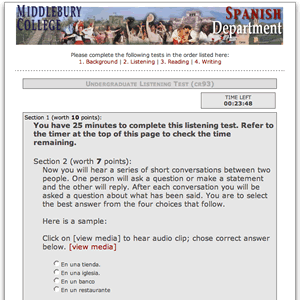December 22, 2005
Segue version 1.5 has been released on SourceForge and is now running at Middlebury College. This version fixes some bugs, makes some user interface changes, and adds a few new features including:
- Sidebar Navigation – Segue pages links can be displayed in either the left or right sidebar
- Sidebar Content blocks – HTML content can be displayed in either sidebar column
- Sidebar RSS feeds – RSS feeds can now be displayed in sidebar columns.
- Categories – Segue has always allowed users to categorize content blocks. this version allows for multiple tags for any given block and introduces a category page type that will display all blocks in a given category
- Participant List – Site owners can now display a list of all the participants and editors in a given site. If a site has associated sites (i.e. sites for participants that are associated with the site), then links to these sites are automatically created.
- Presentation Mode – Segue pages that is set to display one content block at a time can function as slide shows and include pagination and a select menu that allows users to jump to any given slide



 November 3, 2004
November 3, 2004